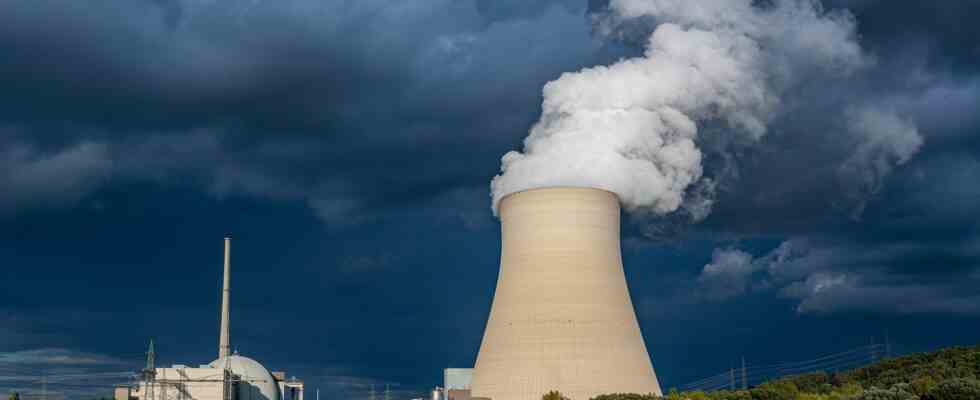Status: 10/17/2022 8:51 p.m
After weeks of argument, Chancellor Scholz has spoken a word of power: The three remaining nuclear power plants should be able to continue operating until April 15, 2023. Criticism comes from the Greens.
Chancellor Olaf Scholz made a clear announcement within the government in the nuclear power plant dispute. The remaining three German nuclear power plants should be able to continue running until April 15, 2023 at the latest.
Based on his authority to issue guidelines, Scholz ordered that the legal basis be created to operate the Isar 2, Neckarwestheim 2 and Emsland nuclear power plants beyond December 31, until April 15, 2023 at the latest. He sent a letter to this effect to Economics Minister Robert Habeck, Environment Minister Steffi Lemke and Finance Minister Christian Lindner.
Tina Hassel, ARD Berlin, on Chancellor Scholz’s order to extend nuclear power plant runtimes
10/17/2022 6:55 p.m
Chancellor insists on timely proposals
Scholz went on to say that “in parallel with this decision” an ambitious law to increase energy efficiency should be presented. In addition, the political agreement between the economics ministries in the federal government and North Rhine-Westphalia and the energy company RWE on the coal phase-out in the Rhenish area should be “implemented by legislation”.
Among other things, the agreement provides for two lignite-fired power plants to run longer, until 2024, but to bring forward the phase-out of coal in the Rhenish mining area by eight years to 2030. In his letter, Scholz asks the responsible ministers “to present the relevant regulatory proposals to the cabinet in a timely manner”.
FDP for nuclear reactivation
For days, the FDP and the Greens in particular had been arguing about whether and for how long the three nuclear power plants that were still in operation should continue to operate. A plan by Economics Minister Robert Habeck had envisaged transferring only the Isar 2 nuclear power plant in Bavaria and Neckarwestheim 2 in Baden-Württemberg to a so-called operational reserve and thus enabling continued operation until mid-April if necessary. At their party conference at the weekend, the Greens once again ruled out continued operation of the Emsland nuclear reactor beyond 2022.
The FDP around Finance Minister Christian Lindner, on the other hand, insisted on the continued operation of the Emsland nuclear power plant and on running times until spring 2024. If necessary, nuclear power plants that had already been shut down should be reactivated.
Lindner: Clarity created
Lindner welcomed Scholz’s decision. “It is in the vital interest of our country and its economy that we maintain all energy production capacities this winter. The Chancellor has now created clarity,” said Lindner. FDP faction leader Christian Dürr wrote on Twitter: “Good news against the background of the energy crisis.”
The SPD parliamentary group also agreed. “The chancellor uses his authority to set guidelines and presents an appropriate, pragmatic solution for nuclear power,” writes Katja Mast, parliamentary director of the SPD parliamentary group, on Twitter. Now you have to put all your energy into expanding renewable energies.
Green for further talks
Criticism came from the Greens. “We note that Chancellor Olaf Scholz is exercising his authority to set guidelines,” said the parliamentary group leaders Katharina Dröge and Britta Haßelmann. “We will now discuss with our parliamentary group how to deal with the Chancellor’s decision.” It is “regrettable” that Scholz and the SPD are apparently ready to put the Emsland nuclear power plant into reserve operation, “although there is no factual or technical reason for this,” said the two faction leaders.
“The Emsland nuclear power plant is not necessary for grid stability,” said the party’s co-chairman, Ricarda Lang, of the dpa news agency. “We’re going to have talks about that.” It is clear that no new fuel rods will be procured and that all German nuclear power plants will be taken off the grid on April 15, 2023. Her party colleague, Environment Minister Steffi Lemke, made a similar statement on Twitter. “It remains with the nuclear phase-out.”
CDU leader Friedrich Merz criticized the decision from the Chancellery as insufficient. It is not enough that the nuclear power plants can continue to run until mid-April 2023, Merz told the newspaper “Welt”. “The German nuclear power plants must – as the FDP has demanded – continue to run with new fuel rods until 2024.” Bavaria’s Prime Minister and CSU boss Markus Söder was disappointed. “This is a solution to the traffic light dispute, but not to the electricity problem in Germany,” he wrote on Twitter.
RWE wants to make preparations
The industry also reacted. The energy company RWE announced that it would implement the nuclear power plant decision quickly. “This is a political decision that we can understand in the current energy crisis,” explains the group. RWE will immediately make all the necessary preparations to enable the power operation of its Emsland power plant by April 15.
The head of the Federal Network Agency, Klaus Müller, wrote on Twitter: “Smart compromise on security of supply.” The environmental organization Greenpeace reacted with outrage. “The extension of the lifetime of the nuclear power plants exposes us all to an irresponsible risk,” explained the executive director of Greenpeace Germany, Martin Kaiser.

